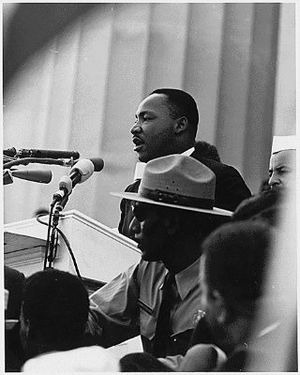Martin Luther King
Reverend Martin Luther King, Jr., Ph.D. (1929-1968) was the pastor of the Ebenezer Baptist Church in Atlanta, Georgia, who became an advocate against discrimination based on race and later a critic of the war in Vietnam. He founded the Southern Christian Leadership Conference. On Dec. 31, 1955, he led the nonviolent boycott of city buses of Montgomery, Alabama, after Rosa Parks was arrested for not moving to the back of the bus.[1]
Rev. King wrote his most famous writing, “Letter From A Birmingham Jail” (1963), while imprisoned for demonstrating against segregated eating facilities.
Rev. King's most famous speech, delivered to a huge crowd gathered in Washington, D.C. in 1964, chanted the refrain "I Have a Dream" of an end to segregation and discrimination. It was a brilliant Christian sermon that drew upon verses and images in the Bible,[2] ending in "Thank God Almighty, we are free at last!"[3]
The same year Rev. King was awarded the Nobel Peace Prize. In 1968, Rev. King was assassinated by James Earl Ray on April 4, 1968 in Memphis, Tennessee.
On April 16, 1963, Rev. King wrote:
- As the Apostle Paul carried the gospel of Jesus Christ ... so am I compelled to carry the gospel... I must make two honest confessions to you, my Christian and Jewish brothers ...
- I stand in the middle of two opposing forces ... One is a force of complacency ... The other force is one of bitterness and hatred, and it comes perilously close to advocating violence. It is expressed in the various black nationalist groups ... the largest being Elijah Muhammad's Muslim movement.
- Nourished by frustration over racial discrimination, this movement is made up of people who have lost faith in America ...
- I have tried to stand between these two forces ... for there is the more excellent way of love ...
- One day the South will know that when these disinherited children of God sat down at lunch counters they were standing up for what is best in the American dream and for the most sacred values in our Judeo-Christian heritage."
In his 1964 book, WHY WE CAN'T WAIT, Rev. King wrote:
- Whenever this issue of compensatory or preferential treatment for the Negro is raised, some of our friends recoil in horror. The Negro should be granted equality, they agree, but he should ask for nothing more. On the surface, this appears reasonable, but it is not realistic. For it is obvious that if a man enters the starting line of a race three hundred years after another man, the first would have to perform some incredible feat in order to catch up.
References
- ↑ http://www.thekingcenter.org/mlk/chronology.html
- ↑ For example, the speech recited Isaiah 40:4-5.
- ↑ http://www.americanrhetoric.com/speeches/mlkihaveadream.htm
